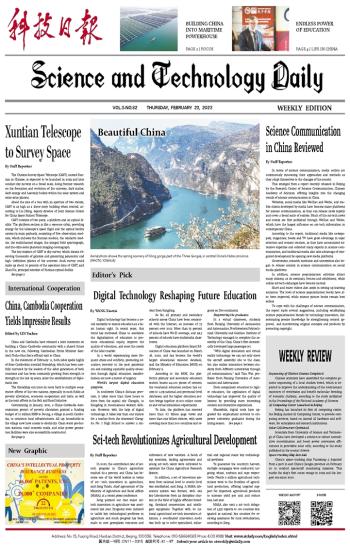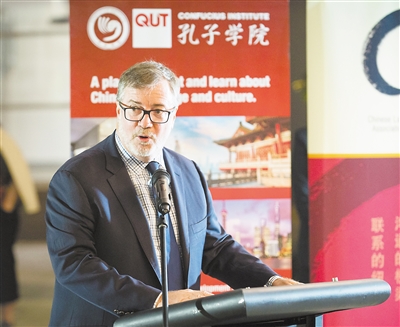
 Endless Power of Education
Endless Power of Education Building China into Maritime Powerhouse
Building China into Maritime Powerhouse Xuntian Telescope to Survey Space
Xuntian Telescope to Survey Space Beautiful China
Beautiful China Science Communication in China Reviewed
Science Communication in China Reviewed Digital Technology Reshaping Future Education
Digital Technology Reshaping Future Education China, Cambodia Cooperation Yields Impressive Results
China, Cambodia Cooperation Yields Impressive Results WEEKLY REVIEW
WEEKLY REVIEW Sci-tech Revolutionizes Agricultural Development
Sci-tech Revolutionizes Agricultural Development New Graphic
New Graphic WECHAT ACCOUNT
WECHAT ACCOUNT
 |
"It is a blessing and a gift to be an educator, because it is a big responsibility to educate the younger generation, the future of the world," said Antoine Barnaart, director of Confucius Institute of Queensland University of Technology, Australia. Barnaart is a highly respected expert in the field of education, having dedicated nearly 40 years of his life to teaching and managing higher education and vocational programs, both in Australia and internationally.
In a recent interview with Science and Technology Daily, the Australian educator shared his insights on topics like cross-cultural communication and vocational education.
Education, the most powerful aid
With a wealth of experience and a deep commitment to his work, Barnaart has made a significant impact on the lives of his students and communities in the Pacific Islands.
Barnaart is specially concerned about the fate of people living in the Pacific Islands countries, who are highly vulnerable to the impact of climate change. He has been committed to helping people, especially the younger generation in these countries, such as Kiribati and Fiji, receive the right type of aid and support, in order to help them overcome the challenges they face.
From his perspective, "Education, ideas, and knowledge can be the most powerful type of aid, rather than focusing too much on building infrastructure, which can have a limited lifespan, and requires expertise and resources to maintain." Barnaart believes that "clear and uncomplicated" education and support can empower these communities to build a brighter future for themselves and their families.
He has seen the first-hand challenges faced by the younger generation living in Kiribati, where employment opportunities are limited, forcing many young people to look for study and work opportunities overseas. He also recognizes that young people need more than just technical skills to be successful in today's competitive global workplace. "They also need strong language skills, core employability skills, and cross-cultural skills," he said.
Barnaart emphasizes the role of learning foreign languages in communicating values and cultures. "Studying both language and culture allows you to know more than just words and grammar. It allows you to know what to say, when to say it, how to say it, and when to say nothing," said he.
Best time in his professional life
From 2004 to 2007, Barnaart led the Australia-China Vocational Education Project in Chongqing. "It was one of the best times in my professional life," he said.
His experience working in China was extremely fulfilling as he found his Chinese counterparts highly motivated, eager to learn and open to new ideas. Moreover, he was impressed by the fact that Chinese central and municipal governments provided substantial financial and policy support for the project.
The joint efforts of the teams from Australia and China have generated many tangible signs of progress. According to his counterparts in Chongqing, the Australian team helped "change their mindset and perspective" regarding how their system and school could improve vocational education outcomes.
"Now, in many areas of China, I believe vocational education is world-class," Barnaart said. Nowadays, he is impressed by the balance between practical and theoretical training in China's vocational education system, especially in Chongqing. He applauded the policy-based approach to training and a constant focus on competency based assessments.
At the same time, the vocational schools and colleges in China are well-equipped with the necessary equipment and facilities to provide hands-on training for every individual student. According to Barnaart, the establishment of closer partnerships with industry has resulted in a highly dynamic learning environment that prepares students well for careers in their respective fields. These close partnerships have been critical in ensuring that the provided education meets the needs of industry and that graduates are equipped with the necessary skills for the workforce.
A Life-long educator
Despite reaching retirement age, Barnaart still feels the excitement and thrill of being in a classroom and interacting with students. His love for education runs so deep that he has made a choice to be a life-long educator.
One of the reasons why this Australian is so passionate about his work is that he believes teaching is a continuous learning journey. Every year is different, and he is presented with new challenges and opportunities for growth and development.
Being a life-long educator is not just a job or career choice, but a calling that will drive him forward. He finds joy in sharing his knowledge and experiences with students, and the friendships he has forged along the way make the journey even more meaningful.
In 2007 in the Great Hall of the People, Beijing, Barnaart was awarded the Chinese Government Friendship Award, by the Government of the People's Republic of China, in recognition of an outstanding contribution to the development and construction of China by a foreign expert.
This article is also contributed by Dr.BI Liangliang from the Chinese Association for Science of Science and S&T Policy.

 Next
Next



